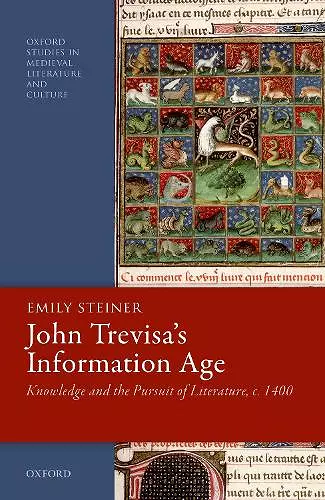John Trevisa's Information Age
Knowledge and the Pursuit of Literature, c. 1400
Format:Hardback
Publisher:Oxford University Press
Published:20th Aug '21
Should be back in stock very soon

What would medieval English literature look like if we viewed it through the lens of the compendium? In that case, John Trevisa might come into focus as the major author of the fourteenth century. Trevisa (d. 1402) made a career of translating big informational texts from Latin into English prose. These included Ranulph Higden's Polychronicon, an enormous universal history, Bartholomaeus Anglicus's well-known natural encyclopedia De proprietatibus rerum, and Giles of Rome's advice-for-princes manual, De regimine principum. These were shrewd choices, accessible and on trend: De proprietatibus rerum and De regimine principum had already been translated into French and copied in deluxe manuscripts for the French and English nobility, and the Polychronicon had been circulating England for several decades. This book argues that John Trevisa's translations of compendious informational texts disclose an alternative literary history by way of information culture. Bold and lively experiments, these translations were a gamble that the future of literature in England was informational prose. This book argues that Trevisa's oeuvre reveals an alternative literary history more culturally expansive and more generically diverse than that which we typically construct for his contemporaries, Geoffrey Chaucer and William Langland. Thirteenth- and early fourteenth-century European writers compiled massive reference books which would shape knowledge well into the Renaissance. This study maintains that they had a major impact on English poetry and prose. In fact, what we now recognize to be literary properties emerged in part from translations of medieval compendia with their inventive ways of handling vast quantities of information.
It is heartening to have this new comprehensive edition of C manuscript accompanied by a novel and easy-to-read English translation of the romance. The Old French text has benefited from fresh insights that Short brings in his informative introduction and the ample notes; a conspectus of the main narrative episodes of the romance is also helpful. As a modern-language version of a lesser-known medieval work, Short's edition and translation not only contribute to deepening our appreciation of the text and its tradition but also act as a reminder that hybrid, not easily classifiable texts falling outside of formed canons are undeniably worthy of scholarly attention. * Jane Beal, Speculum *
Emily Steiner's brilliantly wide-ranging new monograph John Trevisa's Information Age explores the collection of political, theological, and literary contexts that governed medieval practices of encyclopedic writing. * Hope Doherty-Harrison, Journal of Medieval Religious Cultures *
... will take its place in the medieval critical canon as a landmark achievement in our exploration of the evolution of English as a literary language and the vernacular as a generative force in the compilation and interpretation of information through the ages. * Michael Calabrese, California State University, Los Angeles, Modern Philology *
A brilliant work of scholarship that carefully (and at times playfully) examines Trevisa's corpus of work--including his vernacular renderings of lengthy prose treatises, paratextual finding aids, and accumulative annotations--to identify the "properties" of a rhythmical and scientific style that (in)forms the very makings of English literature and information culture...For those seeking to understand the development of vernacular information culture in late medieval and early renaissance England, I cannot imagine a better figure to study than Trevisa and a better scholarly companion than this marvelous book. * Alex Mueller, University of Massachusetts Boston, Medieval Review *
ISBN: 9780192896902
Dimensions: 240mm x 164mm x 24mm
Weight: 592g
304 pages